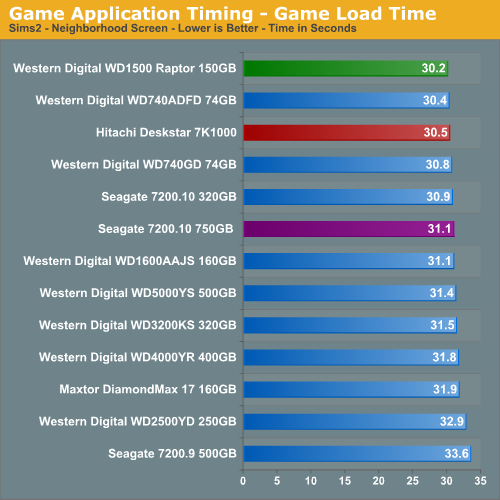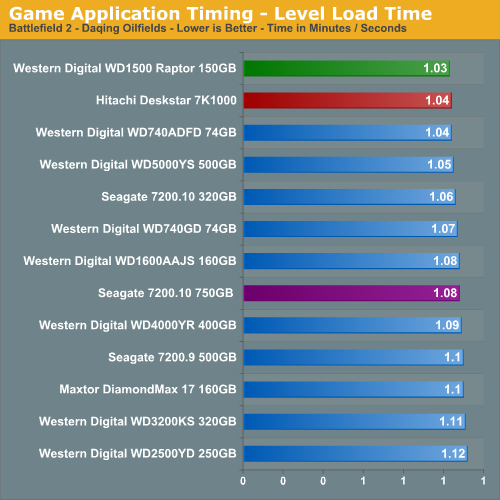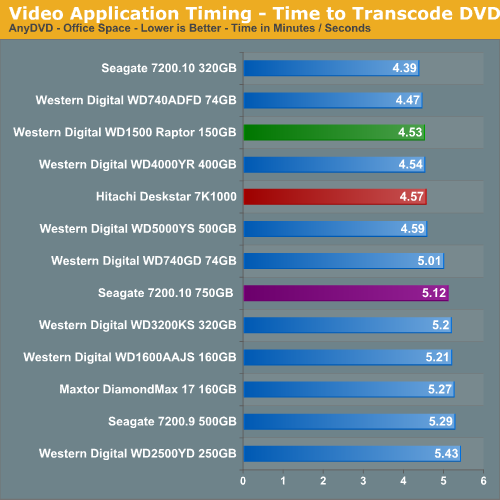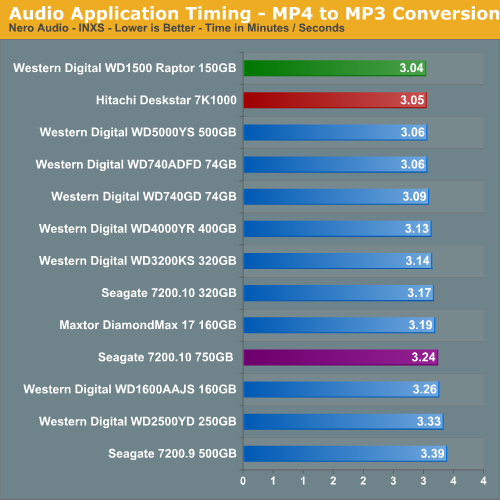Hitachi Deskstar 7K1000: Terabyte Storage arrives on the Desktop
by Gary Key on March 19, 2007 8:00 AM EST- Posted in
- Storage
Actual Application Performance
Our application benchmarks are designed to show application performance results with times being reported in minutes / seconds or seconds only, with lower scores being better. Our graph engine does not allow for a time format such a 1:05 (one minute, five seconds) so this time value will be represented as 1.05. While these tests will show some differences between the drives it is important to understand we are no longer measuring the pure performance of the hard drive but how well our platform performs with each individual drive. The performance of a hard drive is an integral part of the computer platform but other factors such as memory, CPU, core logic, and even driver choice can play a major role in determining how well the hard drive performs in any given task. Also worth noting is that new features of Windows Vista - specifically SuperFetch - can further reduce the measured performance differences between hard drives.
Game Load Test
Our Sims 2 - Open for Business test measures the time it takes to load the initial portion of the game. Our application timer starts when the game icon is initiated until the neighborhood menu appears.

The results are basically the same as our IPEAK results as the WD Raptor series continues to lead all drives although the performance differences are not as drastic once we take into account the entire platform. We notice the Hitachi drive scoring better than the other 7200rpm drives and the drive seemed just as fast as the Raptors over the course of game play, something we generally did not find with our other top performing 7200rpm drives.
Game Level Load
This test centers on the actual loading of a playable level within our game selections. We run Battlefield 2 and measure the time it takes to load the Daqing Oilfields level. Our application timer begins when the start single player icon is initiated and ends when the join game icon is visible.

The WD1500ADFD Raptor continues its pattern of being the best available drive for the gaming enthusiast and our subjective opinion also matches the test scores although we are openly debating this statement now. Of course it is easy to debate our continued love affair with the Raptor as the difference in load times between the WD1500 and the 7K1000 drive was only one second so it appears we are getting close to finally having a Raptor killer in the large capacity 7200rpm drives. We firmly believe the areal density and 32 MB cache advantages of the Hitachi 7K1000 make up for the rotational and random access advantages of the Raptor in our gaming tests.
AnyDVD 5.9.6
Our next test has us utilizing the "ripping" function of AnyDVD to copy the Office Space DVD file from our source drive to our test drive. Our DVD features 29 files totaling 7.55GB of data and is an excellent test for determining the write speed of a drive.

Our Seagate Barracuda 7200.10 320GB drive scores extremely well in this test due to exceptional read times with large data blocks in sequential order, something its larger sibling does not handle well. This is one of the few tests where our 7K1000 does not finish ahead of the other 7200rpm drives but it does improve upon its performance when compared to the IPEAK results. The 7K1000 still manages a top five finish while finishing 15 seconds ahead of the Seagate 750GB drive.
Nero Audio Encode
Our last test has us utilizing the audio encoding functions of Nero to convert our INXS Greatest Hits audio files in MP4 format to a high quality variable rate MP3 file for our portable player. Our test features 16 files totaling 137MB of data and is an excellent test for determining the read and write speed of a drive.

The test results show once again the amount of time a fast hard drive like the WD Raptor can save over the course of audio or video file manipulation session. In this case, the WD1500ADFD finishes just ahead of the 7K1000 where it handles small block sizes in sequential order slightly better due to is rotational speed advantage.
Our application benchmarks are designed to show application performance results with times being reported in minutes / seconds or seconds only, with lower scores being better. Our graph engine does not allow for a time format such a 1:05 (one minute, five seconds) so this time value will be represented as 1.05. While these tests will show some differences between the drives it is important to understand we are no longer measuring the pure performance of the hard drive but how well our platform performs with each individual drive. The performance of a hard drive is an integral part of the computer platform but other factors such as memory, CPU, core logic, and even driver choice can play a major role in determining how well the hard drive performs in any given task. Also worth noting is that new features of Windows Vista - specifically SuperFetch - can further reduce the measured performance differences between hard drives.
Game Load Test
Our Sims 2 - Open for Business test measures the time it takes to load the initial portion of the game. Our application timer starts when the game icon is initiated until the neighborhood menu appears.

The results are basically the same as our IPEAK results as the WD Raptor series continues to lead all drives although the performance differences are not as drastic once we take into account the entire platform. We notice the Hitachi drive scoring better than the other 7200rpm drives and the drive seemed just as fast as the Raptors over the course of game play, something we generally did not find with our other top performing 7200rpm drives.
Game Level Load
This test centers on the actual loading of a playable level within our game selections. We run Battlefield 2 and measure the time it takes to load the Daqing Oilfields level. Our application timer begins when the start single player icon is initiated and ends when the join game icon is visible.

The WD1500ADFD Raptor continues its pattern of being the best available drive for the gaming enthusiast and our subjective opinion also matches the test scores although we are openly debating this statement now. Of course it is easy to debate our continued love affair with the Raptor as the difference in load times between the WD1500 and the 7K1000 drive was only one second so it appears we are getting close to finally having a Raptor killer in the large capacity 7200rpm drives. We firmly believe the areal density and 32 MB cache advantages of the Hitachi 7K1000 make up for the rotational and random access advantages of the Raptor in our gaming tests.
AnyDVD 5.9.6
Our next test has us utilizing the "ripping" function of AnyDVD to copy the Office Space DVD file from our source drive to our test drive. Our DVD features 29 files totaling 7.55GB of data and is an excellent test for determining the write speed of a drive.

Our Seagate Barracuda 7200.10 320GB drive scores extremely well in this test due to exceptional read times with large data blocks in sequential order, something its larger sibling does not handle well. This is one of the few tests where our 7K1000 does not finish ahead of the other 7200rpm drives but it does improve upon its performance when compared to the IPEAK results. The 7K1000 still manages a top five finish while finishing 15 seconds ahead of the Seagate 750GB drive.
Nero Audio Encode
Our last test has us utilizing the audio encoding functions of Nero to convert our INXS Greatest Hits audio files in MP4 format to a high quality variable rate MP3 file for our portable player. Our test features 16 files totaling 137MB of data and is an excellent test for determining the read and write speed of a drive.

The test results show once again the amount of time a fast hard drive like the WD Raptor can save over the course of audio or video file manipulation session. In this case, the WD1500ADFD finishes just ahead of the 7K1000 where it handles small block sizes in sequential order slightly better due to is rotational speed advantage.










74 Comments
View All Comments
mino - Tuesday, March 20, 2007 - link
Sorry Jared, didn't saw you comment...Otherwise, thanks for a nice review. Especially that explanation of AAM.
Many guys ask me reguraly why I don't buy non-AAM drives...
yacoub - Monday, March 19, 2007 - link
51C is a bit warm for a HD, no? I wonder how that impacts its life expectancy...yyrkoon - Tuesday, March 20, 2007 - link
To be a bit more specific, I think it was google who did testing of enterprise type drives, and did a bunch of testing, I'm sure google will turn something up ;)yyrkoon - Monday, March 19, 2007 - link
According to multiple studies done, HDD life expectancy is not affected by heat. I'm sure there are situations, where you literally have parts melting, that could be problematic, but there you have it.Justin Case - Wednesday, March 21, 2007 - link
Yes and no. A temperature around 50-60 ºC will not slowly "cook" the drive, but if it rises above a certain level (ex., 120º C), it can kill it instantly. Fast drives with a lot of platters can get hot very quickly, and if they're mounted on plastic rails (poor thermal conductors) with poor air circulation, their life expectancy is probably less than a day. I've seen it happen more than once.yyrkoon - Thursday, March 22, 2007 - link
Boiling point of water is around ~191F-212F, 120C is 248F, a CPU could not handle this temperature, what makes you think a HDD could ? Most consumer grade electronic do not take kindly to anything hottter than ~70C-80C. The only exception I can think of in a computer, might possibly be a graphics card, and even then, I personally would not expect it to last long as these temperatures.Most computers will not / should not exceed ~40C-50C ambient case temperature, and a lot (mine included) run much cooler. It is not uncommon for my CPU to run sub 100F (winter time), and sub 120F (summer time) under a load. Most of the time, the ambient case temperature of my case is easily under 105F.
Anyhow, the whole point here is: practise common sense with your electronics concerning heat. 120C is obviously WAY too hot for a HDD, as well as most consumer grade electronics. This also doesnt negate the fact that several studies have been done in enterprise envoirnments, to prove that heat ( again, within reason ) is not a factor in HDD falure. The whole point of these studies were to prove ( or disprove ) the point of buying enterprise grade hard drives vs. regular HDDs.
I have always wondered why you guys ( who ever claims that HDD fails often ) buy new HDDs with your new system, now I think I know ;)
phusg - Tuesday, March 20, 2007 - link
Please refer us to these multiple studies. AFAIK the only one that corroborates this is the google one, which you mention in a later post. Also I'd question this one study's relevance to home use, as not everyone leaves their drives running 24/7 as google does. My personal feeling is that repeated expansion and contraction damages drives most, and obviously if the drive is running hotter then the expansion will be greater and so will the damage to the longevity of the drive.yyrkoon - Thursday, March 22, 2007 - link
What you're reffering to is known as 'Hysteresus'. Excuse the bad spelling, if I misspelled that (it is not a word I used often). Anyhow, this is the effect, that rapid cooling / heating has on an object over time, and the object eventually becomming brittle because of this.As for the refferal, use google. Do not expect everyone to do your homework for you ;) However, I can tell you that, I personally have many HDDs, some of which are over 12 years old, have seen a lot of heat in their time, and are fully functional. One of which is a 80MB Maxtor . . .
Spoelie - Tuesday, March 20, 2007 - link
According to my own experience that's not really true. Last summer I had trouble with my main OS drive (a Seagate 7200.8 160GB) where windows would slow to a grind, there were multiple IO errors in the event log, then DMA would switch off and corrupt data showed up on the disc. I thought it died to be honest.However, before throwing it out I tried upping the cooling. I had 3 Seagate HDs in the HD chamber in front without intake fans, and they were incredibly warm to the touch. Directing a 120mm 800rpm fan over them to test immediately solved all issues, and the drive was as reliable again as ever (no permanent damage even). They're now very cool to the touch. Kinda obvious when I think about it, in a normal case the drive makes metal to metal contact and the HD bay itself functions as a large heat sink, while in the Antec there is no contact at all and the drive is "suspended in the air" on rubber grommets.
It was a particular hot summer period but still, heat shouldn't be ignored.
Gary Key - Monday, March 19, 2007 - link
It is well within the drives operating range and remember the temp dropped to 43C once we turned the front fan on in the case. I was expecting it to run warmer actually.